2008 NISSAN LATIO coolant temperature
[x] Cancel search: coolant temperaturePage 1272 of 2771
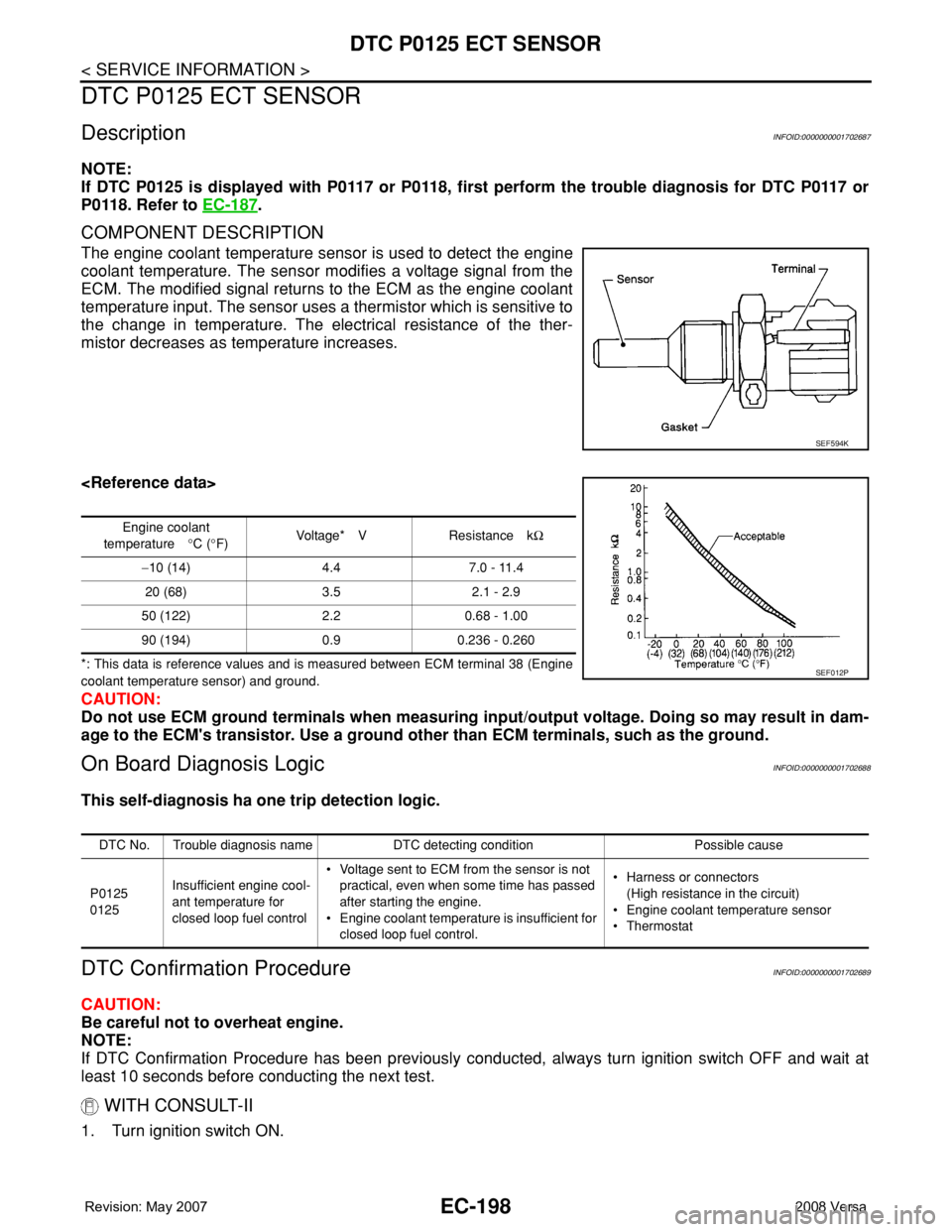
EC-198
< SERVICE INFORMATION >
DTC P0125 ECT SENSOR
DTC P0125 ECT SENSOR
DescriptionINFOID:0000000001702687
NOTE:
If DTC P0125 is displayed with P0117 or P0118, first perform the trouble diagnosis for DTC P0117 or
P0118. Refer to EC-187
.
COMPONENT DESCRIPTION
The engine coolant temperature sensor is used to detect the engine
coolant temperature. The sensor modifies a voltage signal from the
ECM. The modified signal returns to the ECM as the engine coolant
temperature input. The sensor uses a thermistor which is sensitive to
the change in temperature. The electrical resistance of the ther-
mistor decreases as temperature increases.
*: This data is reference values and is measured between ECM terminal 38 (Engine
coolant temperature sensor) and ground.
CAUTION:
Do not use ECM ground terminals when measuring input/output voltage. Doing so may result in dam-
age to the ECM's transistor. Use a ground other than ECM terminals, such as the ground.
On Board Diagnosis LogicINFOID:0000000001702688
This self-diagnosis ha one trip detection logic.
DTC Confirmation ProcedureINFOID:0000000001702689
CAUTION:
Be careful not to overheat engine.
NOTE:
If DTC Confirmation Procedure has been previously conducted, always turn ignition switch OFF and wait at
least 10 seconds before conducting the next test.
WITH CONSULT-II
1. Turn ignition switch ON.
SEF594K
Engine coolant
temperature°C (°F)Voltage* V Resistance kΩ
−10 (14) 4.4 7.0 - 11.4
20 (68) 3.5 2.1 - 2.9
50 (122) 2.2 0.68 - 1.00
90 (194) 0.9 0.236 - 0.260
SEF012P
DTC No. Trouble diagnosis name DTC detecting condition Possible cause
P0125
0125Insufficient engine cool-
ant temperature for
closed loop fuel control• Voltage sent to ECM from the sensor is not
practical, even when some time has passed
after starting the engine.
• Engine coolant temperature is insufficient for
closed loop fuel control.• Harness or connectors
(High resistance in the circuit)
• Engine coolant temperature sensor
•Thermostat
Page 1273 of 2771
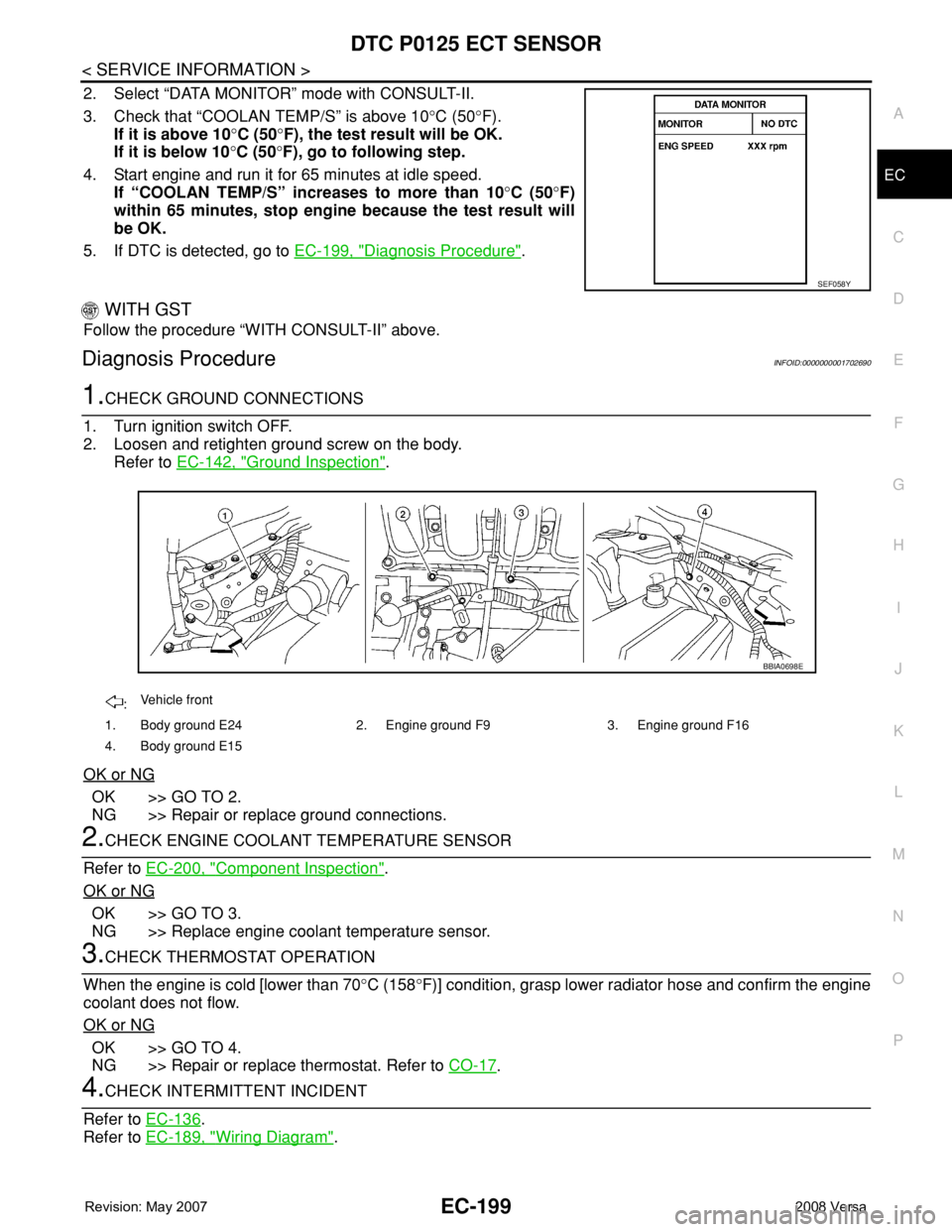
DTC P0125 ECT SENSOR
EC-199
< SERVICE INFORMATION >
C
D
E
F
G
H
I
J
K
L
MA
EC
N
P O
2. Select “DATA MONITOR” mode with CONSULT-II.
3. Check that “COOLAN TEMP/S” is above 10°C (50°F).
If it is above 10°C (50°F), the test result will be OK.
If it is below 10°C (50°F), go to following step.
4. Start engine and run it for 65 minutes at idle speed.
If “COOLAN TEMP/S” increases to more than 10°C (50°F)
within 65 minutes, stop engine because the test result will
be OK.
5. If DTC is detected, go to EC-199, "
Diagnosis Procedure".
WITH GST
Follow the procedure “WITH CONSULT-II” above.
Diagnosis ProcedureINFOID:0000000001702690
1.CHECK GROUND CONNECTIONS
1. Turn ignition switch OFF.
2. Loosen and retighten ground screw on the body.
Refer to EC-142, "
Ground Inspection".
OK or NG
OK >> GO TO 2.
NG >> Repair or replace ground connections.
2.CHECK ENGINE COOLANT TEMPERATURE SENSOR
Refer to EC-200, "
Component Inspection".
OK or NG
OK >> GO TO 3.
NG >> Replace engine coolant temperature sensor.
3.CHECK THERMOSTAT OPERATION
When the engine is cold [lower than 70°C (158°F)] condition, grasp lower radiator hose and confirm the engine
coolant does not flow.
OK or NG
OK >> GO TO 4.
NG >> Repair or replace thermostat. Refer to CO-17
.
4.CHECK INTERMITTENT INCIDENT
Refer to EC-136
.
Refer to EC-189, "
Wiring Diagram".
SEF058Y
:Vehicle front
1. Body ground E24 2. Engine ground F9 3. Engine ground F16
4. Body ground E15
BBIA0698E
Page 1274 of 2771
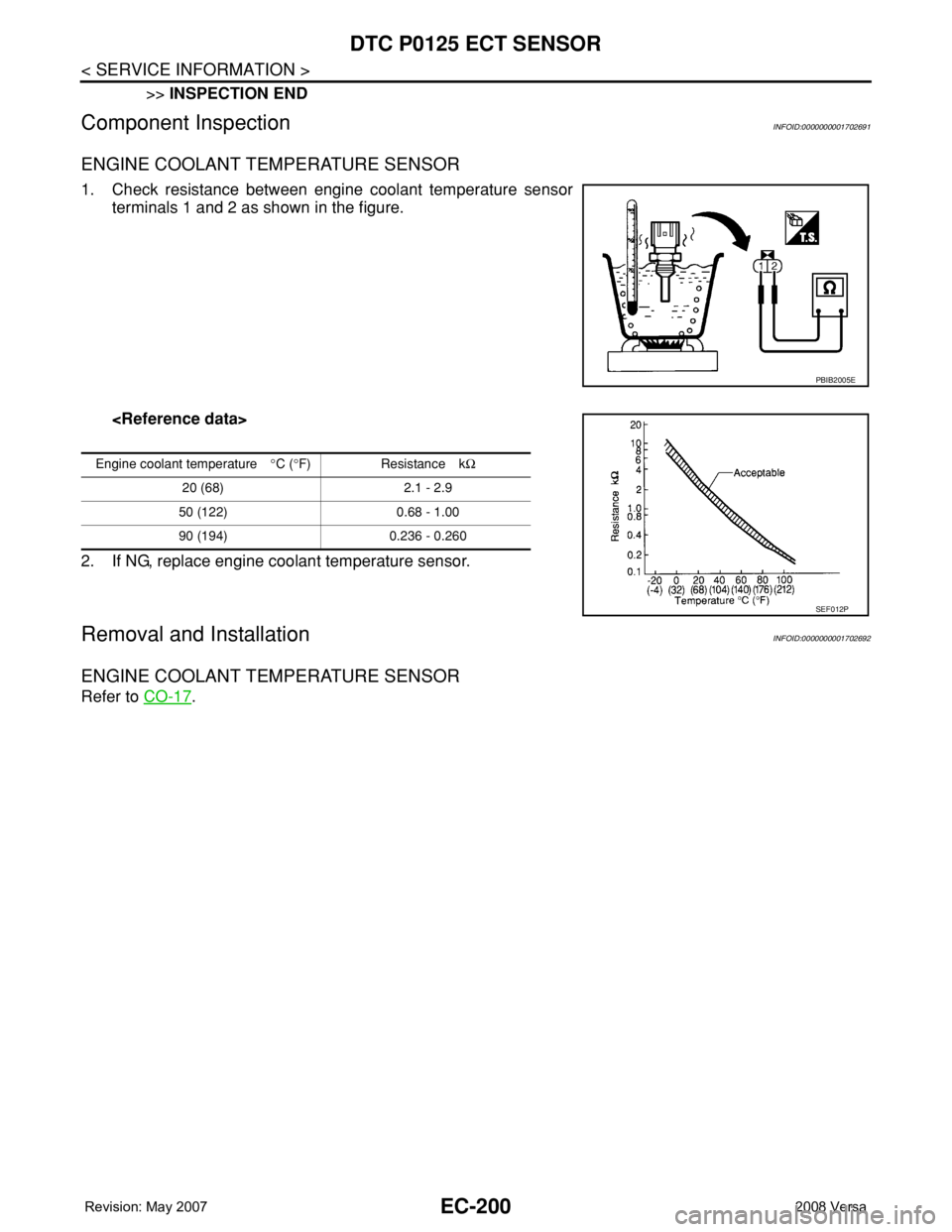
EC-200
< SERVICE INFORMATION >
DTC P0125 ECT SENSOR
>>INSPECTION END
Component InspectionINFOID:0000000001702691
ENGINE COOLANT TEMPERATURE SENSOR
1. Check resistance between engine coolant temperature sensor
terminals 1 and 2 as shown in the figure.
2. If NG, replace engine coolant temperature sensor.
Removal and InstallationINFOID:0000000001702692
ENGINE COOLANT TEMPERATURE SENSOR
Refer to CO-17.
PBIB2005E
Engine coolant temperature°C (°F) Resistance kΩ
20 (68) 2.1 - 2.9
50 (122) 0.68 - 1.00
90 (194) 0.236 - 0.260
SEF012P
Page 1275 of 2771
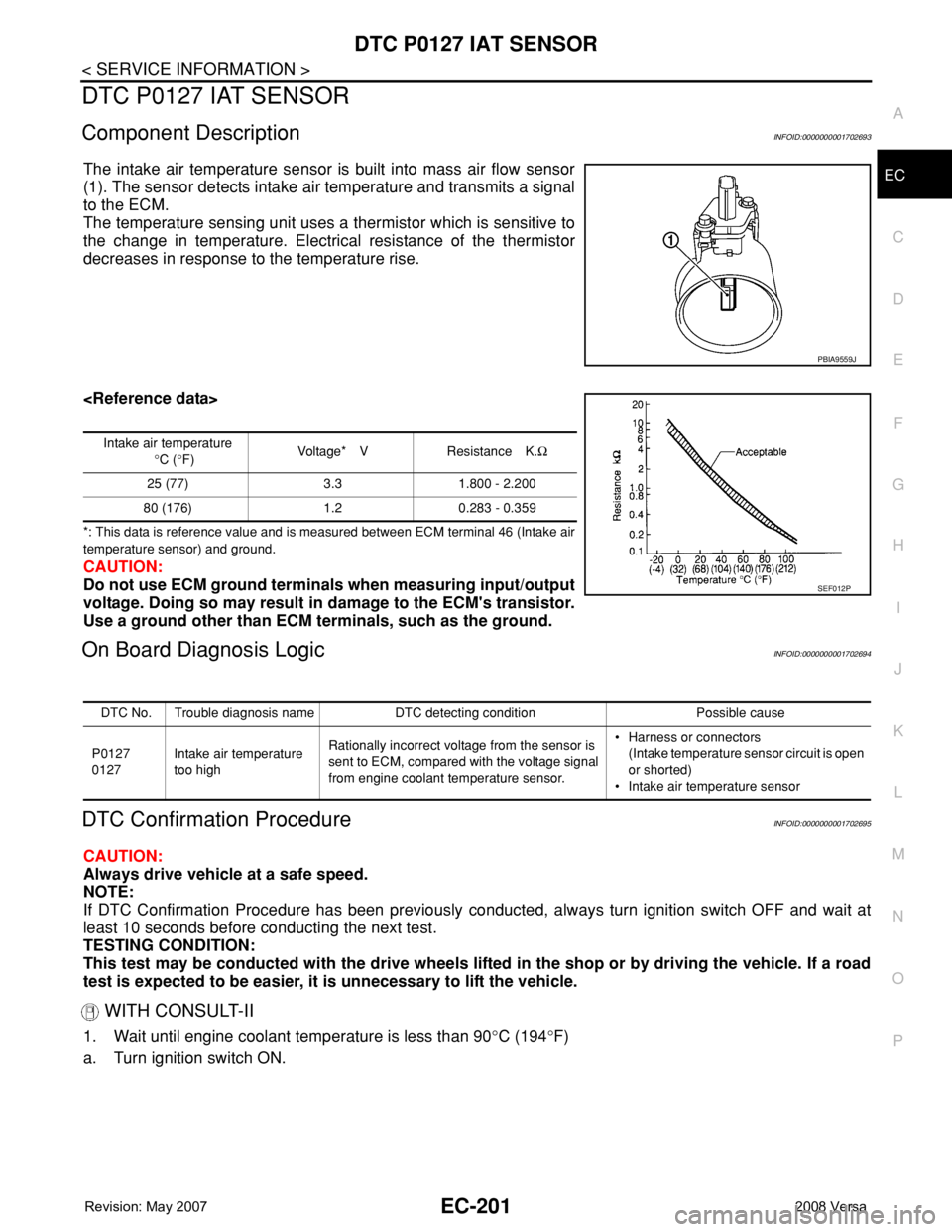
DTC P0127 IAT SENSOR
EC-201
< SERVICE INFORMATION >
C
D
E
F
G
H
I
J
K
L
MA
EC
N
P O
DTC P0127 IAT SENSOR
Component DescriptionINFOID:0000000001702693
The intake air temperature sensor is built into mass air flow sensor
(1). The sensor detects intake air temperature and transmits a signal
to the ECM.
The temperature sensing unit uses a thermistor which is sensitive to
the change in temperature. Electrical resistance of the thermistor
decreases in response to the temperature rise.
*: This data is reference value and is measured between ECM terminal 46 (Intake air
temperature sensor) and ground.
CAUTION:
Do not use ECM ground terminals when measuring input/output
voltage. Doing so may result in damage to the ECM's transistor.
Use a ground other than ECM terminals, such as the ground.
On Board Diagnosis LogicINFOID:0000000001702694
DTC Confirmation ProcedureINFOID:0000000001702695
CAUTION:
Always drive vehicle at a safe speed.
NOTE:
If DTC Confirmation Procedure has been previously conducted, always turn ignition switch OFF and wait at
least 10 seconds before conducting the next test.
TESTING CONDITION:
This test may be conducted with the drive wheels lifted in the shop or by driving the vehicle. If a road
test is expected to be easier, it is unnecessary to lift the vehicle.
WITH CONSULT-II
1. Wait until engine coolant temperature is less than 90°C (194°F)
a. Turn ignition switch ON.
PBIA9559J
Intake air temperature
°C (°F)Voltage* V Resistance K.Ω
25 (77) 3.3 1.800 - 2.200
80 (176) 1.2 0.283 - 0.359
SEF012P
DTC No. Trouble diagnosis name DTC detecting condition Possible cause
P0127
0127Intake air temperature
too highRationally incorrect voltage from the sensor is
sent to ECM, compared with the voltage signal
from engine coolant temperature sensor.• Harness or connectors
(Intake temperature sensor circuit is open
or shorted)
• Intake air temperature sensor
Page 1276 of 2771
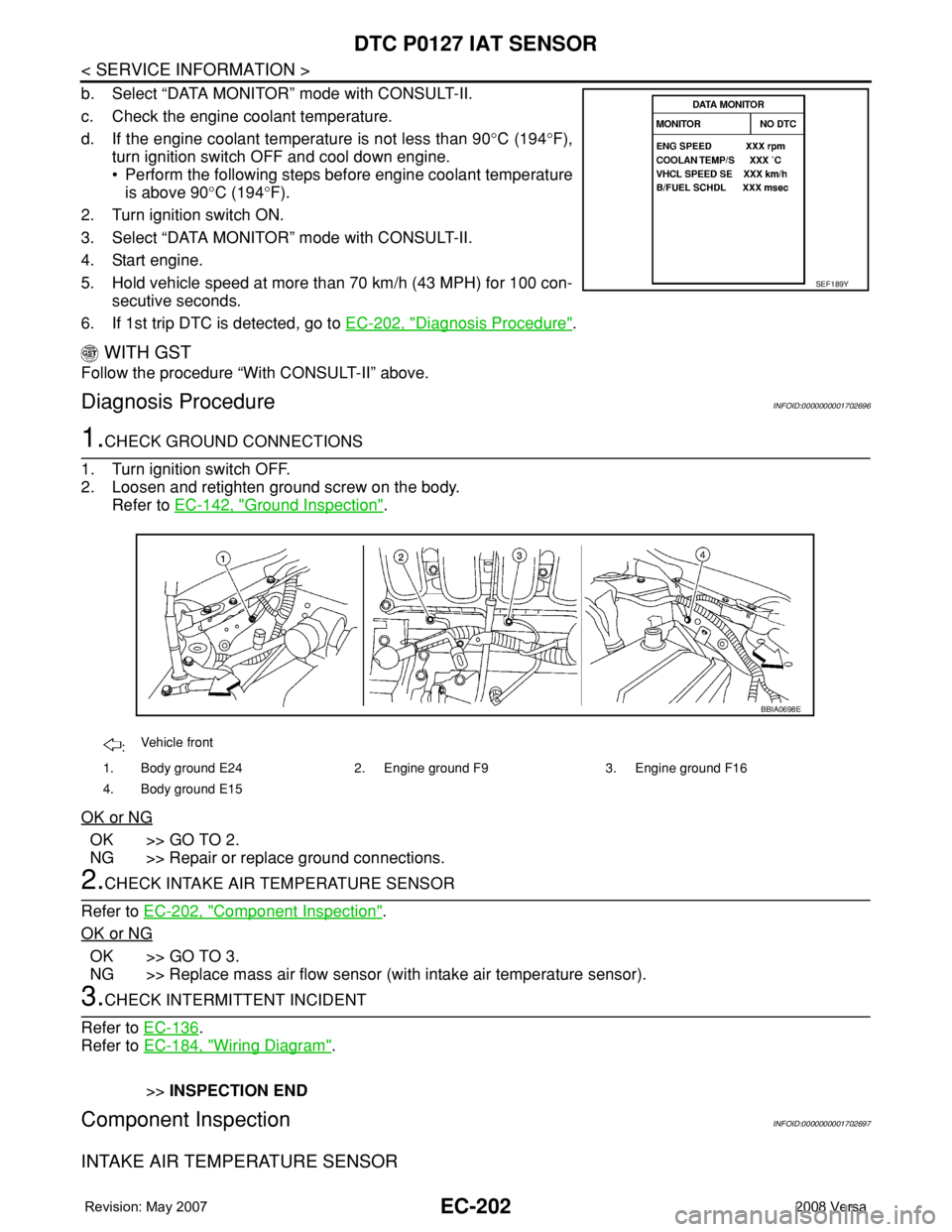
EC-202
< SERVICE INFORMATION >
DTC P0127 IAT SENSOR
b. Select “DATA MONITOR” mode with CONSULT-II.
c. Check the engine coolant temperature.
d. If the engine coolant temperature is not less than 90°C (194°F),
turn ignition switch OFF and cool down engine.
• Perform the following steps before engine coolant temperature
is above 90°C (194°F).
2. Turn ignition switch ON.
3. Select “DATA MONITOR” mode with CONSULT-II.
4. Start engine.
5. Hold vehicle speed at more than 70 km/h (43 MPH) for 100 con-
secutive seconds.
6. If 1st trip DTC is detected, go to EC-202, "
Diagnosis Procedure".
WITH GST
Follow the procedure “With CONSULT-II” above.
Diagnosis ProcedureINFOID:0000000001702696
1.CHECK GROUND CONNECTIONS
1. Turn ignition switch OFF.
2. Loosen and retighten ground screw on the body.
Refer to EC-142, "
Ground Inspection".
OK or NG
OK >> GO TO 2.
NG >> Repair or replace ground connections.
2.CHECK INTAKE AIR TEMPERATURE SENSOR
Refer to EC-202, "
Component Inspection".
OK or NG
OK >> GO TO 3.
NG >> Replace mass air flow sensor (with intake air temperature sensor).
3.CHECK INTERMITTENT INCIDENT
Refer to EC-136
.
Refer to EC-184, "
Wiring Diagram".
>>INSPECTION END
Component InspectionINFOID:0000000001702697
INTAKE AIR TEMPERATURE SENSOR
SEF189Y
:Vehicle front
1. Body ground E24 2. Engine ground F9 3. Engine ground F16
4. Body ground E15
BBIA0698E
Page 1278 of 2771
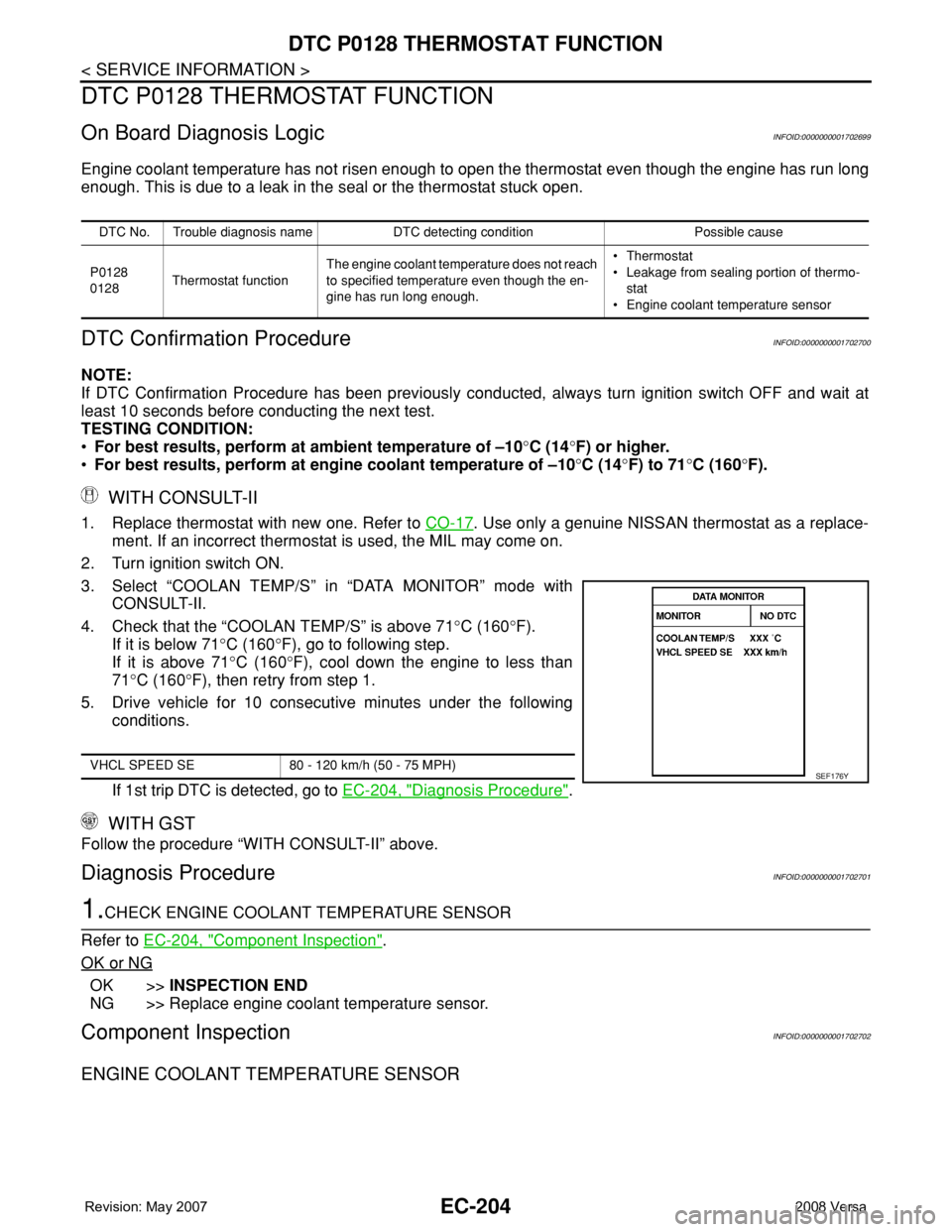
EC-204
< SERVICE INFORMATION >
DTC P0128 THERMOSTAT FUNCTION
DTC P0128 THERMOSTAT FUNCTION
On Board Diagnosis LogicINFOID:0000000001702699
Engine coolant temperature has not risen enough to open the thermostat even though the engine has run long
enough. This is due to a leak in the seal or the thermostat stuck open.
DTC Confirmation ProcedureINFOID:0000000001702700
NOTE:
If DTC Confirmation Procedure has been previously conducted, always turn ignition switch OFF and wait at
least 10 seconds before conducting the next test.
TESTING CONDITION:
•For best results, perform at ambient temperature of –10°C (14°F) or higher.
•For best results, perform at engine coolant temperature of –10°C (14°F) to 71°C (160°F).
WITH CONSULT-II
1. Replace thermostat with new one. Refer to CO-17. Use only a genuine NISSAN thermostat as a replace-
ment. If an incorrect thermostat is used, the MIL may come on.
2. Turn ignition switch ON.
3. Select “COOLAN TEMP/S” in “DATA MONITOR” mode with
CONSULT-II.
4. Check that the “COOLAN TEMP/S” is above 71°C (160°F).
If it is below 71°C (160°F), go to following step.
If it is above 71°C (160°F), cool down the engine to less than
71°C (160°F), then retry from step 1.
5. Drive vehicle for 10 consecutive minutes under the following
conditions.
If 1st trip DTC is detected, go to EC-204, "
Diagnosis Procedure".
WITH GST
Follow the procedure “WITH CONSULT-II” above.
Diagnosis ProcedureINFOID:0000000001702701
1.CHECK ENGINE COOLANT TEMPERATURE SENSOR
Refer to EC-204, "
Component Inspection".
OK or NG
OK >>INSPECTION END
NG >> Replace engine coolant temperature sensor.
Component InspectionINFOID:0000000001702702
ENGINE COOLANT TEMPERATURE SENSOR
DTC No. Trouble diagnosis name DTC detecting condition Possible cause
P0128
0128Thermostat functionThe engine coolant temperature does not reach
to specified temperature even though the en-
gine has run long enough.•Thermostat
• Leakage from sealing portion of thermo-
stat
• Engine coolant temperature sensor
VHCL SPEED SE 80 - 120 km/h (50 - 75 MPH)SEF176Y
Page 1279 of 2771
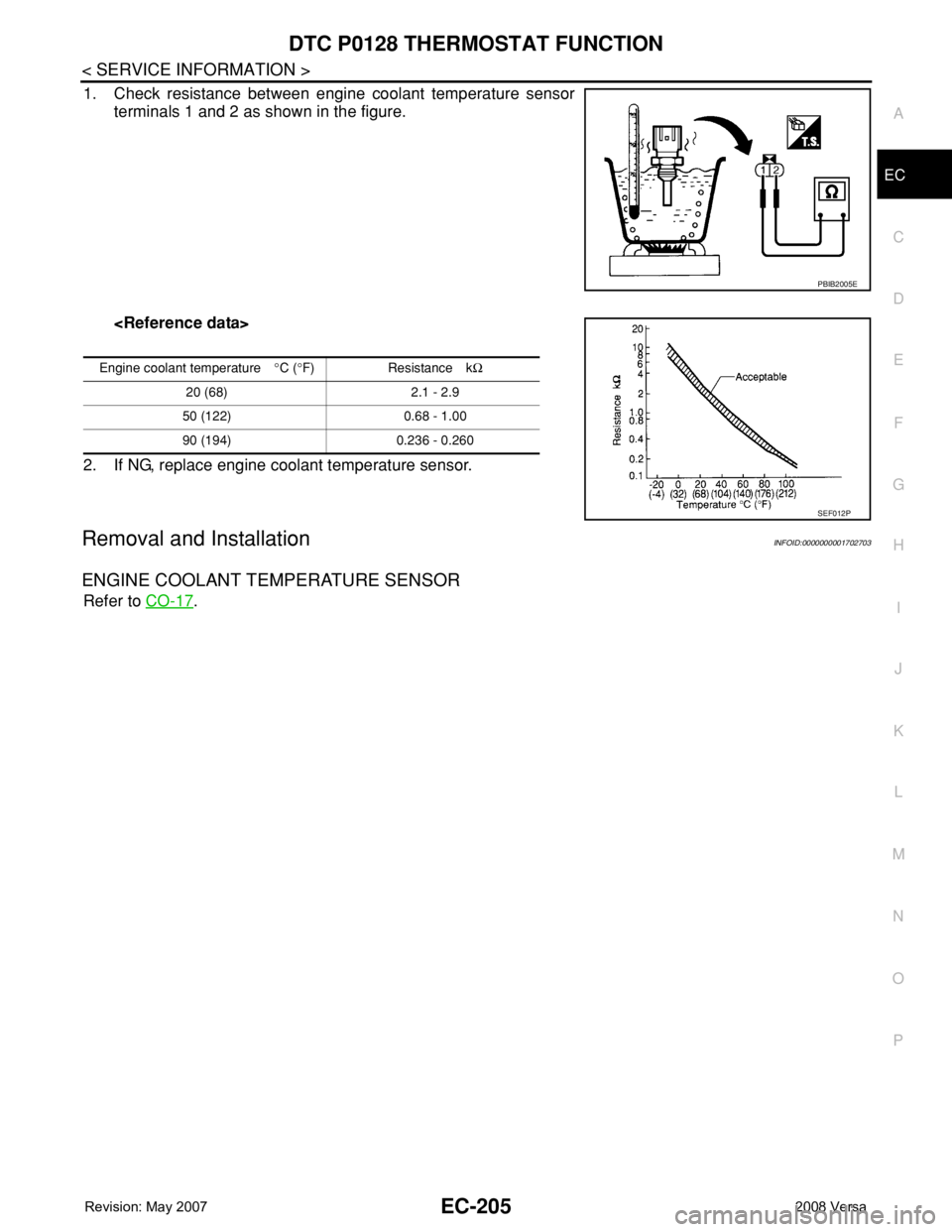
DTC P0128 THERMOSTAT FUNCTION
EC-205
< SERVICE INFORMATION >
C
D
E
F
G
H
I
J
K
L
MA
EC
N
P O
1. Check resistance between engine coolant temperature sensor
terminals 1 and 2 as shown in the figure.
2. If NG, replace engine coolant temperature sensor.
Removal and InstallationINFOID:0000000001702703
ENGINE COOLANT TEMPERATURE SENSOR
Refer to CO-17.
PBIB2005E
Engine coolant temperature°C (°F) Resistance kΩ
20 (68) 2.1 - 2.9
50 (122) 0.68 - 1.00
90 (194) 0.236 - 0.260
SEF012P
Page 1332 of 2771
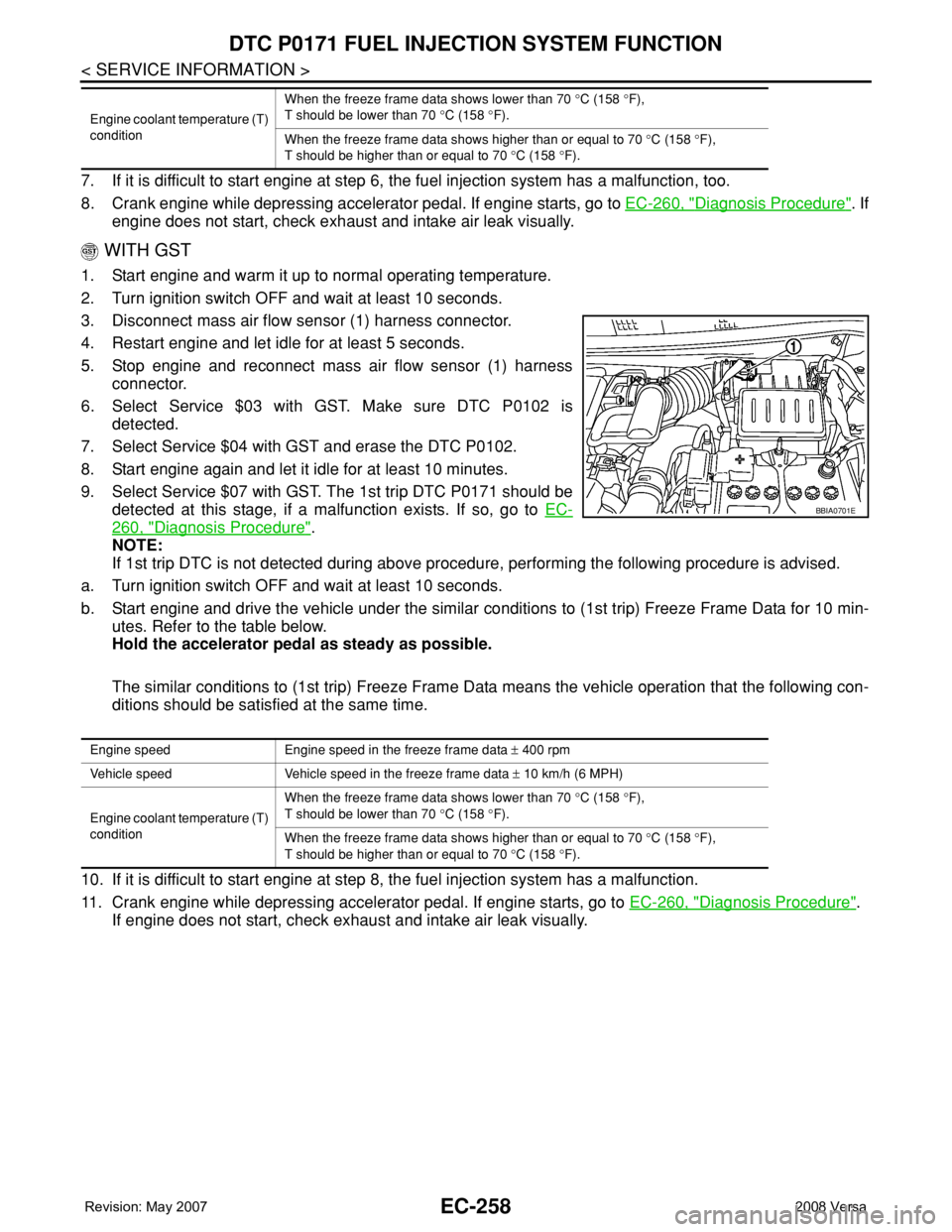
EC-258
< SERVICE INFORMATION >
DTC P0171 FUEL INJECTION SYSTEM FUNCTION
7. If it is difficult to start engine at step 6, the fuel injection system has a malfunction, too.
8. Crank engine while depressing accelerator pedal. If engine starts, go to EC-260, "
Diagnosis Procedure". If
engine does not start, check exhaust and intake air leak visually.
WITH GST
1. Start engine and warm it up to normal operating temperature.
2. Turn ignition switch OFF and wait at least 10 seconds.
3. Disconnect mass air flow sensor (1) harness connector.
4. Restart engine and let idle for at least 5 seconds.
5. Stop engine and reconnect mass air flow sensor (1) harness
connector.
6. Select Service $03 with GST. Make sure DTC P0102 is
detected.
7. Select Service $04 with GST and erase the DTC P0102.
8. Start engine again and let it idle for at least 10 minutes.
9. Select Service $07 with GST. The 1st trip DTC P0171 should be
detected at this stage, if a malfunction exists. If so, go to EC-
260, "Diagnosis Procedure".
NOTE:
If 1st trip DTC is not detected during above procedure, performing the following procedure is advised.
a. Turn ignition switch OFF and wait at least 10 seconds.
b. Start engine and drive the vehicle under the similar conditions to (1st trip) Freeze Frame Data for 10 min-
utes. Refer to the table below.
Hold the accelerator pedal as steady as possible.
The similar conditions to (1st trip) Freeze Frame Data means the vehicle operation that the following con-
ditions should be satisfied at the same time.
10. If it is difficult to start engine at step 8, the fuel injection system has a malfunction.
11. Crank engine while depressing accelerator pedal. If engine starts, go to EC-260, "
Diagnosis Procedure".
If engine does not start, check exhaust and intake air leak visually.
Engine coolant temperature (T)
conditionWhen the freeze frame data shows lower than 70 °C (158 °F),
T should be lower than 70 °C (158 °F).
When the freeze frame data shows higher than or equal to 70 °C (158 °F),
T should be higher than or equal to 70 °C (158 °F).
BBIA0701E
Engine speed Engine speed in the freeze frame data ± 400 rpm
Vehicle speed Vehicle speed in the freeze frame data ± 10 km/h (6 MPH)
Engine coolant temperature (T)
conditionWhen the freeze frame data shows lower than 70 °C (158 °F),
T should be lower than 70 °C (158 °F).
When the freeze frame data shows higher than or equal to 70 °C (158 °F),
T should be higher than or equal to 70 °C (158 °F).